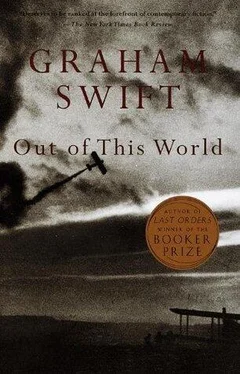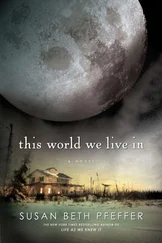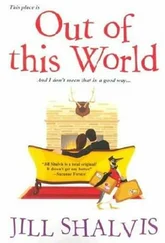Graham Swift - Out of This World
Здесь есть возможность читать онлайн «Graham Swift - Out of This World» весь текст электронной книги совершенно бесплатно (целиком полную версию без сокращений). В некоторых случаях можно слушать аудио, скачать через торрент в формате fb2 и присутствует краткое содержание. Год выпуска: 2012, Издательство: Vintage, Жанр: Современная проза, на английском языке. Описание произведения, (предисловие) а так же отзывы посетителей доступны на портале библиотеки ЛибКат.
- Название:Out of This World
- Автор:
- Издательство:Vintage
- Жанр:
- Год:2012
- ISBN:нет данных
- Рейтинг книги:3 / 5. Голосов: 1
-
Избранное:Добавить в избранное
- Отзывы:
-
Ваша оценка:
- 60
- 1
- 2
- 3
- 4
- 5
Out of This World: краткое содержание, описание и аннотация
Предлагаем к чтению аннотацию, описание, краткое содержание или предисловие (зависит от того, что написал сам автор книги «Out of This World»). Если вы не нашли необходимую информацию о книге — напишите в комментариях, мы постараемся отыскать её.
Out of This World — читать онлайн бесплатно полную книгу (весь текст) целиком
Ниже представлен текст книги, разбитый по страницам. Система сохранения места последней прочитанной страницы, позволяет с удобством читать онлайн бесплатно книгу «Out of This World», без необходимости каждый раз заново искать на чём Вы остановились. Поставьте закладку, и сможете в любой момент перейти на страницу, на которой закончили чтение.
Интервал:
Закладка:
Eleven were condemned and seven received prison sentences. Of the condemned, only Goering, whose defence had been — is this the right word? — so spirited, played a final trick on his audience by swallowing concealed poison. It is said that there was horse-trading amongst the Allied nations as to who should die. It is also said that the executioner deliberately bungled the hangings, so that some, at least, of those who died, died slowly and horribly. Was this a crime against humanity?
I don’t recall now where they had flown that night. Conceivably, it was Nuremberg. In any case I hadn’t flown with them (and I was glad of that). But I was taking shots of the planes as they returned at dawn. For one of the Lancs things had gone badly — or not so badly, depending on how you look at it, since the plane got back, as others didn’t, and all save two of the crew were unharmed. They were transferring the pilot from the cockpit to the ambulance, and I should have been stopped, perhaps, from coming so close. But (I would discover this later over and over again) people don’t stop you. They don’t, as a rule, make a grab for your camera, or for you. They are too busy, too caught up. You are just another mad part of the scene. It’s afterwards that they say: Did you see?! That bastard with the camera!
The pilot was supported in a cradle formed by the joined arms of two ambulance crew who were walking him from the plane. His arms were round their necks and he was held in a sort of jammed foetal position, as if his knees couldn’t be prized from his abdomen. His lips were curled back and his teeth clamped together, so he looked like some terrible parody of a man straining to void his bowels. He had flown back from Germany and landed his aircraft with a cannon shell up his arse, and his face was green with the pain.
I took three, four pictures, which the Air Ministry promptly impounded, these not being the sort of pictures they had in mind (even if they were, according to my brief, ‘authentic visual records of the air war’). But several years later they released them, and one of them is included in Aftermaths , in the first section called ‘Bombers 1945’ (it is captioned simply ‘Lancaster pilot’ with the name of the base and the date), and became regarded as one of my ‘famous’ early shots.
That pilot was awarded, posthumously, the D.F.C. for his act of heroism in bringing back his plane and crew. When you look at the photo you do not think, I think, of heroism. You think of pain and absurdity. But your mind focuses on that agonized young airman in an act of compassionate concentration that it would be sacrilegious to call sentimental. You think of personal things. You wonder who he was. You imagine his home somewhere, his parents, his girl. You think of him as an unsuspecting schoolboy. You do not think — it would seem almost blasphemous to do so — of the many hundreds of men, women and children who were killed or maimed as a result of the raid in which this young pilot took part. You do not think of the bombs stored in the bomb-bay of the now emptied and shot-up plane in the background. Nor would you think (assuming you were told the nature of the pilot’s fatal wound) of the cannon shell, that particular cannon shell, amongst so many cannon shells. How it must have been turned out, one of millions, in some mid-European works. How it must have passed through the hands of a munitions worker, a girl in a mob-cap, imagine. Whether she had relatives who had been killed in air raids. Whether she could have conceivably guessed the final resting place of that shell. Whether she ever thought of where those shells it was her business to send on their way might end up. Surely she did, but then there were so many shells: to think of them all, impossible; to think of one, pointless. But you stare fixedly at this suffering figure, picked out from the random carnage of war, destined not only for a posthumous medal but also — But then something rebels against your concentration, something undermines the very purity of your pity. Also to be the object of photographic contemplation.
‘An act of heroism’ suggests always, if only at first, something glamorous and emblematic: a handsome face turned to some dangerous prospect. We say of certain things that they are not only done but must be seen to be done. We say this, for example, of Justice. When that dead pilot was awarded the D.F.C., you could say that heroism was seen to be done. This is not to suggest there was no actual heroism, but the actual heroism may have been of a quite different kind from that which went recognized. After all (but again this seems almost blasphemous), what choice did he have? Was it as though he willed his life to culminate in an act, and that particular act, of heroism? And, at the terrible moment, what else could he do, with a parcel of hot metal up his rectum and a dead flight engineer and a damaged aircraft? Appeal to some hidden power and say: Wake me out of this dream?
When I took that photograph I thought to myself, if not in so many words: Let this have no aesthetic content, let this be only like it is, in the middle of things. Since I knew already that photos taken in even the most chaotic circumstances can acquire, lifted from the mad flow of events, a perverse formality and poise. I thought this as I took the picture. I did not think of the pilot. Was this an act of inhumanity?
The two orderlies are staggering slightly. It is like some joke version of the exhausted athlete being carried in triumph. One second please, face the camera please (but his eyes were shut to the world), to record your moment of glory. I half hid behind the swung-open ambulance door, then stepped out and clicked.
My first picture of a dying man.
Until I went to Nuremberg in ’46 I had not seen, at ground level, any of the damage done to Germany. I was not, though I might easily have been, amongst those photographers specifically despatched to record the progress of Liberation and the evidence of defeat. Nor was I amongst those first on the scene, who would never forget being present, when the camps at Buchenwald, Belsen and elsewhere were opened. But a future, now late colleague of mine, Bill Cochrane, was. Our careers evolved along similar lines, since Bill at the time was a War Office photographer, just as I was accredited to the Air Ministry. Some of Bill’s photographs were used in the Allies’ propaganda campaign of post-war ‘enlightenment’ and de-Nazification, others found their way into the mass of documentation submitted to the Nuremberg prosecutors.
Seeing is believing and certain things must be seen to have been done. Without the camera the world might start to disbelieve. At the newly liberated camps local civilians were made to file past the emaciated corpses in order to witness facts of which, despite their proximity, they had no greater knowledge than the newly arrived Allies. There is a photo of Bill’s showing this procedure taking place. A man is looking at something near his feet, with an expression of confusion on his face. You cannot tell if the confusion is the result of what he is looking at or the knowledge that he is being photographed.
Which is worse: to have to look at piles of corpses? Or to photograph people looking at piles of corpses? Would Bill have taken this photo if he were not ordered to do so? Was it an act of inhumanity?
Bill Cochrane was killed in the Congo in ’63, trying to take pictures of an ambush when he had already been hit in the leg. His death itself became a minor news item, there was a half-column report, a brief obituary, and I was asked to attend a memorial service at St Bride’s. Posthumous honours came his way. Should journalists receive medals and citations? For courage and sacrifice in the service of truth? Is it truth they are after, or are they just trying to be heroes?
Читать дальшеИнтервал:
Закладка:
Похожие книги на «Out of This World»
Представляем Вашему вниманию похожие книги на «Out of This World» списком для выбора. Мы отобрали схожую по названию и смыслу литературу в надежде предоставить читателям больше вариантов отыскать новые, интересные, ещё непрочитанные произведения.
Обсуждение, отзывы о книге «Out of This World» и просто собственные мнения читателей. Оставьте ваши комментарии, напишите, что Вы думаете о произведении, его смысле или главных героях. Укажите что конкретно понравилось, а что нет, и почему Вы так считаете.












